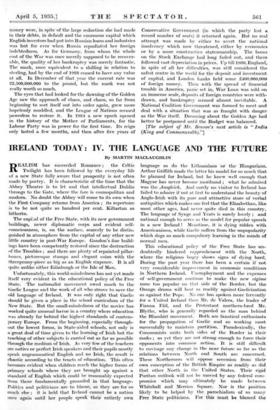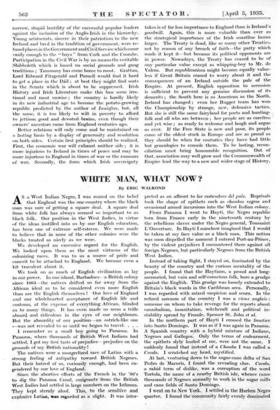IRELAND TODAY: IV. THE LANGUAGE AND THE FUTURE By MARTIN
MACLAUGHLIN REALISM- has succeeded Romance; the Celtic Twilight has been followed by the everyday life of a new State fully aware that prosperity is not often made by poetry. It is characteristic of the time that the Abbey Theatre is to let and that intellectual Dublin throngs to the Gate, where the fare is cosmopolitan and Modern. No doubt the Abbey will borne to its own when the First Company returns from America ; its repertoire is to be not quite so hundred per cent. Kiltartan as hitherto.
The capital of the Free State, with its new government buildings, newer diplomatic corps and evident self- consciousness, is, on the surface, scarcely to be distin- guished in atmosphere from the capital of any other new little country in post-War Europe. Gandon's fine build- ings have been competently restored since the destruction of the.Troubles ; and there are plenty of repainted pillar- boxes, picturesque stamps and elegant coins with the threepenny-pieeOas- big as an -English sixpence. It is all quite unlike either Edinburgh or the Isle of Man.
Unfortunately, this world-mindedness has not yet made itself very evident in the educational policy of the Free State. The nationalist movement owed much to the Gaelic League and the work of all who strove to save the old language of Ireland. It was only right that Gaelic should be given a place in the school -curriculum Of the New State. But the small-mindedness of the novice has worked quite unusual havoc in a country where education was already far behind the highest standards of contem- porary Europe. From the beginning, especially through- out the lowest forms, in State-aided schools, not only is a great deal of time given to the learning of Irish but the teaching of other subjects is carried Out as far as possible through the medium of Irish. As very few of the teachers are native or perfect Irish speakers and their pupils mostly speak ungrammatical English and no Irish, the result is chaotic according to the tenets of education. This often becomes evident when children reach the higher forms of primary schools where -they are brought up against a standard of English which could be reasonably expected from those fundamentally grounded in that language. Politics and politicians are to blame, as they are for so much else ; it is held that Ireland cannot be a nation (inee again until her people speak their entirely own language as do the Lithuanians or the gungarians, Arthur Griffith made the latter his model for so much that he. planned for Ireland, but he knew well enough that Magyar has never become moribund ; what he admired was the Ausgleich. And surely no visitor to Ireland has failed to admire if not at first to understand the beauty of Anglo-Irish with its pure and attractive store Of verbal antiquities which makes one feel that the Elizabethan, like most other ages, had never quite died in this country. The language of Synge and Yeats is surely lovely ; and national enough to serve as the model for popular speech in a new Ireland ! Meantime, it is dying ridden with Americanisms, while Gaelic suffers from the unpopularity which dogs so much compulsory learning in the minds of normal men.
This educational policy of the Free State has un- doubtedly hindered rapprochement with the North, where the religious bogey shows signs of dying hard. During the past year there has been a certain if not very considerable improvement in economic conditions in Northern Ireland. Unemployment and the expenses of self-government continue to make the new regime none too popular on that side of the Border, but the Orange drums will beat as readily against Gaelieization as against the Pope. No one has spoken more fervently fOr a United Ireland than Mr. de Valera, the leader of Fianna Fiiil, and the Protestant northern-bred Mr. Blythe, who is generally regarded as the man behind the Blueshirt movement. Both are fanatical enthusiasts for the propagation of Gaelic and so working most successfully to maintain partition. Paradoxically, the Communists unite both sides of the Border in their ranks ; as yet they are not strong enough to force their opponents into common action. It is still difficult to envisage any change in the near future so far as the relations between North and South arc concerned. These Northerners will oppose secession from their own conception of the British Empire as readily as did that other North in the United States. Their rigid Puritan outlook will not be moved by any federal com- promise which may ultimately be made between Whitehall and- Merrion Square. Nor is the position likely to be helped by the parochialism of so many Free State politicians. For this must be blamed the narrow, stupid hostility of the successful popular leaders against the inclusion of the Anglo-Irish in the hierarchy. Young aristocrats, sincere in their patriotism to the new Ireland and bred in the tradition. of government, were re- fused places in the Government and Civil Service which came easily enough to the " boys " from Cork and the Coombe. Participation in the Civil War is by no means the veritable Shibboleth which is based on social grounds and gang traditions ; Tammany has come home to roost. Grattan, Lord Edward Fitzgerald and Parnell would find it hard to get a place in the Dill; at best they might find seats in the Senate which is about to be suppressed. Irish History and Irish Literature make this ban seem irra- tional and most unwise ; the country is hardly likely in its new industrial age to become the potato-growing republic predicted by the author of Innisfree, but, all the same, it is too likely to wilt in poverty to afford to jettison good and devoted • brains,- even though their owners' ancestors came from England centuries ago.
Better relations will only come and be maintained on a lasting basis by a display of generosity and resolution on both sides. Certain first principles should be realized. First, the economic war will exhaust neither side ; it is more injurious to Ireland in tithes of peace and may be more injurious to England in times of war or the rumours of war. Secondly, the form which Irish sovereignty takes is of far less importance to England than is Ireland's goodwill. Again, this is more valuable than ever as the strategical importance of the Irish coastline looms larger. The Treaty is dead, like so many other Treaties, not by reason of any breach of faith—the party which made it kept it—but because its political opponents are in power. Nowadays, the Treaty has ceased to be of any particular value except as whipping-boy to Mr. de Valera. But republicanism might become equally value- less if Great Britain ceased to worry about it and the consequences of an Ireland outside the pale of the Empire. At present, English opposition to secession is sufficient to prevent - any genuine discussion of its demerits ; the South here is as American as the North. Ireland has changed ; even her Rugger team has won the Championship by strange, new, defensive tactics. But she is still the same fairyland for poets and hunting- folk and all who are between ; her people are as carefree.' and yet wise ; as ready to welcome and laugh and argue as ever. If the Free State is new and poor, its people come of the oldest stock in Europe and are as proud as they should be when for centuries they have had little but genealogies to console them. To be lasting, recon- ciliation must bring honourable recognition. Out of that, association may well grow and the Commonwealth of Empire lead the way to a new and wider stage of History,











































 Previous page
Previous page